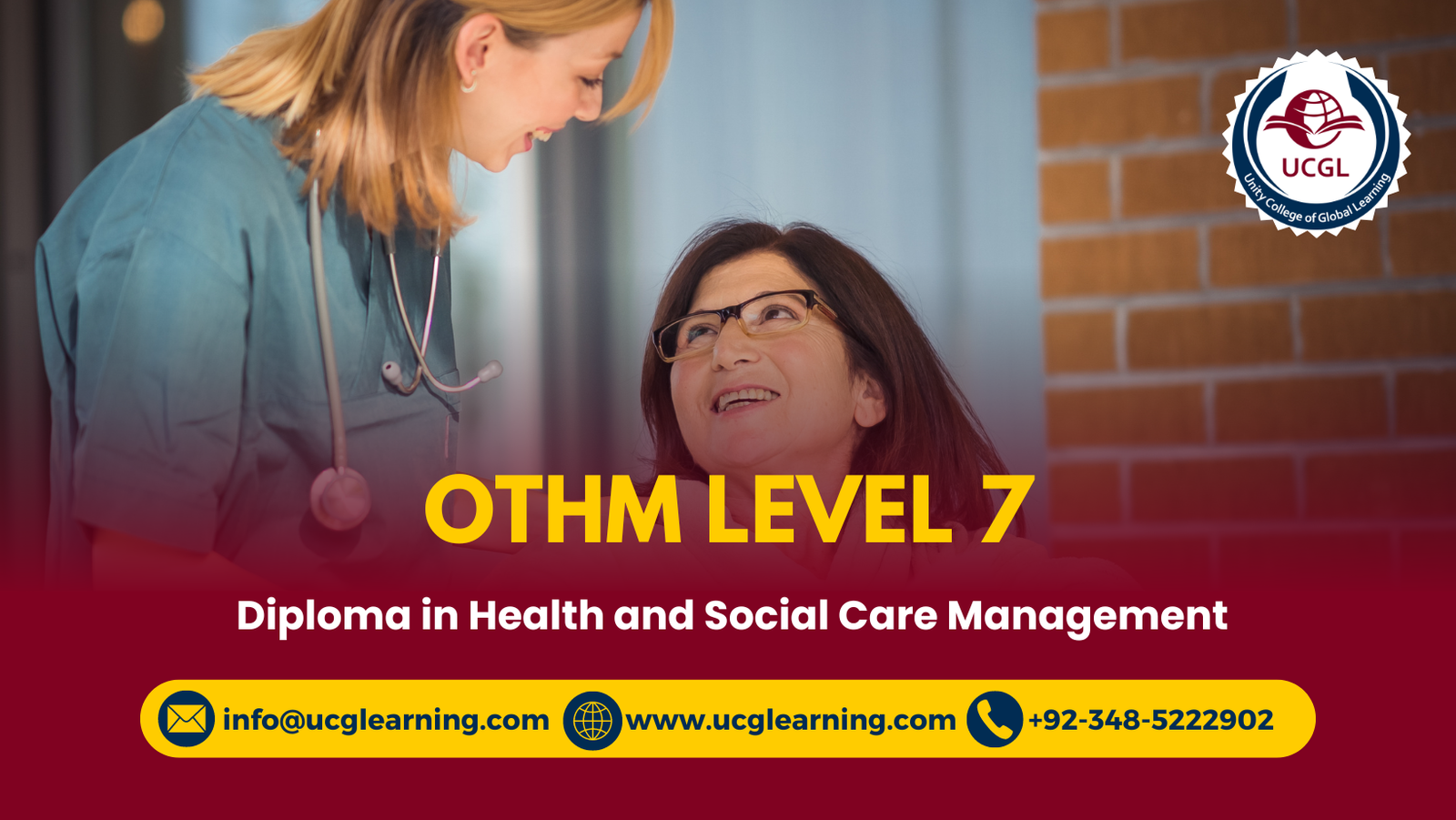OTHM Level 7 Diploma in Health and Social Care Management
In today’s dynamic healthcare landscape, effective management and leadership are crucial to delivering high-quality services and ensuring optimal patient outcomes. The OTHM Level 7 Diploma in Health and Social Care Management is designed for professionals aiming to enhance their skills in healthcare management, leadership, and strategic decision-making. This diploma prepares individuals to navigate the complexities of healthcare systems while driving innovation and excellence in patient care.
Course Introduction
The OTHM Level 7 Diploma in Health and Social Care Management addresses the evolving challenges and opportunities within the healthcare sector. Participants delve into key aspects of healthcare management, including policy development, quality assurance, and organizational leadership. The curriculum emphasizes practical skills and theoretical knowledge essential for managing healthcare facilities and delivering person-centered care.
Course Benefits
- Leadership Development: Develop advanced leadership skills to effectively manage healthcare teams, foster collaboration, and promote a positive organizational culture.
- Strategic Management: Gain expertise in strategic planning, resource allocation, and performance management to optimize healthcare service delivery and patient outcomes.
- Quality Improvement: Implement quality assurance frameworks and continuous improvement processes to enhance service quality and patient safety.
- Policy and Governance: Understand healthcare policies, regulations, and governance frameworks to ensure compliance and ethical practice.
- Career Advancement: Enhance career prospects with a recognized qualification that demonstrates expertise in health and social care management, opening doors to senior leadership roles.
Course Study Units
- Health and Social Care Leadership (20 credits)
- Managing People in Health and Social Care (20 credits)
- Managing Finance in Health and Social Care (20 credits)
- Health and Social Care Strategies and Policies (20 credits)
- Leading Change in Health and Social Care (20 credits)
- Research Methods for Healthcare Professionals (20 credits)
Learning Outcomes
Health and Social Care Leadership (20 credits)
- Strategic Leadership: Develop and apply strategic leadership skills to effectively manage health and social care services, fostering innovation and quality improvement.
- Ethical Leadership: Lead with integrity and ethical principles, promoting compassionate care, equity, and patient-centered practices.
- Team Development: Build and empower diverse teams within health and social care settings, encouraging collaboration, professional development, and a supportive work environment.
- Organizational Culture: Foster a positive organizational culture that prioritizes patient safety, staff well-being, and continuous learning.
- Performance Management: Implement performance management systems to monitor team effectiveness, recognize achievements, and address challenges proactively.
Managing People in Health and Social Care (20 credits)
- Human Resource Management: Apply human resource principles and practices specific to health and social care settings, including recruitment, training, and retention strategies.
- Workforce Development: Develop strategies for professional development, succession planning, and career progression to enhance staff satisfaction and retention.
- Conflict Resolution: Implement conflict resolution strategies to manage interpersonal conflicts and promote a collaborative work environment.
- Diversity and Inclusion: Promote diversity, equity, and inclusion within health and social care teams to ensure culturally competent and responsive care.
- Employee Well-being: Implement initiatives to support staff well-being, resilience, and work-life balance, enhancing overall organizational performance and patient care outcomes.
Managing Finance in Health and Social Care (20 credits)
- Financial Planning: Develop and manage budgets to optimize financial resources while maintaining high-quality care standards and service delivery.
- Financial Analysis: Analyze financial performance indicators and metrics to inform decision-making and identify opportunities for cost savings and revenue generation.
- Resource Allocation: Allocate resources effectively to support strategic priorities, operational efficiency, and sustainable growth within health and social care organizations.
- Risk Management: Implement risk management strategies to mitigate financial risks and ensure financial stability and regulatory compliance.
- Financial Reporting: Prepare and interpret financial reports for stakeholders, including funders, regulators, and senior management, to facilitate informed decision-making.
Health and Social Care Strategies and Policies (20 credits)
- Policy Development: Analyze, develop, and evaluate health and social care policies to address current challenges, promote best practices, and ensure compliance with regulatory requirements.
- Strategic Planning: Develop and implement strategic plans aligned with organizational goals and external factors, such as demographic trends and healthcare reforms.
- Healthcare Regulation: Navigate and comply with healthcare regulations, standards, and governance frameworks to uphold legal and ethical standards of care.
- Quality Improvement: Implement quality assurance processes and performance metrics to monitor and enhance service quality, patient safety, and clinical outcomes.
- Public Health Initiatives: Collaborate with stakeholders to develop and implement public health initiatives that address community needs, promote health equity, and prevent disease.
Leading Change in Health and Social Care (20 credits)
- Change Management: Apply change management theories and models to lead and facilitate organizational change initiatives within health and social care environments.
- Innovation Adoption: Foster a culture of innovation and continuous improvement to drive positive change and respond to evolving healthcare trends and patient needs.
- Stakeholder Engagement: Engage stakeholders, including patients, families, healthcare professionals, and community partners, in change initiatives to ensure buy-in and support.
- Communication Strategies: Develop effective communication strategies to convey change goals, address resistance, and celebrate successes throughout the change process.
- Evaluation and Sustainability: Evaluate the impact of change initiatives on organizational outcomes, patient care, and staff engagement, ensuring sustainability and continuous improvement.
Research Methods for Healthcare Professionals (20 credits)
- Research Design: Design and develop research projects using appropriate methodologies, frameworks, and ethical considerations relevant to health and social care contexts.
- Data Collection: Collect, analyze, and interpret quantitative and qualitative data to generate evidence-based insights and inform decision-making in healthcare settings.
- Literature Review: Conduct comprehensive literature reviews to synthesize existing research, identify gaps in knowledge, and contribute to the advancement of healthcare practice and policy.
- Ethical Considerations: Address ethical considerations in healthcare research, including informed consent, privacy, confidentiality, and protection of vulnerable populations.
- Dissemination of Findings: Communicate research findings effectively through written reports, presentations, and publications to contribute to the body of knowledge and enhance healthcare practice.
These learning outcomes prepare participants of the OTHM Level 7 Diploma in Health and Social Care Management to excel in leadership, management, finance, policy development, change management, and research within diverse health and social care settings. Graduates are equipped to lead teams, drive organizational excellence, and improve patient outcomes in complex healthcare environments.
Who is This Course For?
The OTHM Level 7 Diploma in Health and Social Care Management is ideal for:
- Healthcare Managers: Seeking to advance their careers in healthcare administration, operations, or clinical management.
- Social Care Managers: Responsible for overseeing social care services, including residential care, community support, and rehabilitation programs.
- Healthcare Consultants: Providing advisory services to healthcare organizations on management, strategy, and operational efficiency.
- Government Health Officials: Involved in healthcare policy development, implementation, and regulatory compliance.
Future Progression
Completion of this diploma opens doors to various career advancement opportunities:
- Healthcare Director or CEO: Assume senior leadership roles within healthcare organizations, overseeing strategic initiatives and driving organizational growth.
- Consultancy and Advisory Roles: Provide expertise as a healthcare management consultant, advising organizations on best practices, efficiency improvements, and regulatory compliance.
- Doctoral Studies: Pursue further academic research in healthcare management, health policy, or related fields.
- International Opportunities: Explore global roles in healthcare management, policy development, and public health administration across diverse healthcare settings.
OTHM Level 7 Diploma in Health and Social Care Management equips professionals with the knowledge, skills, and leadership capabilities to navigate the complexities of healthcare management effectively. Embrace this opportunity to make a significant impact in healthcare delivery, improve patient outcomes, and lead transformative change within healthcare organizations.







